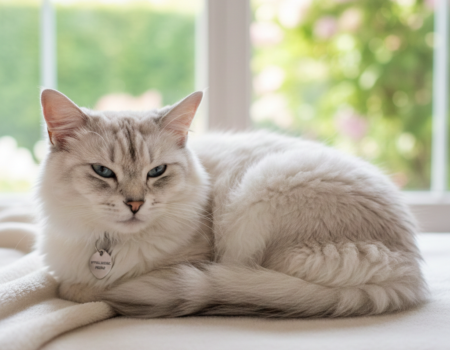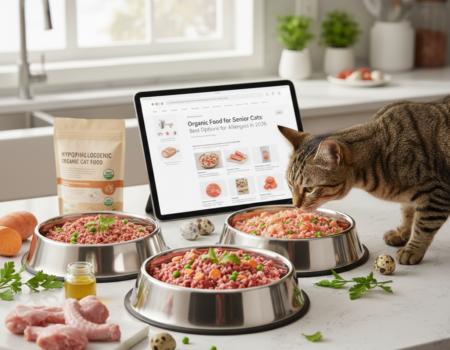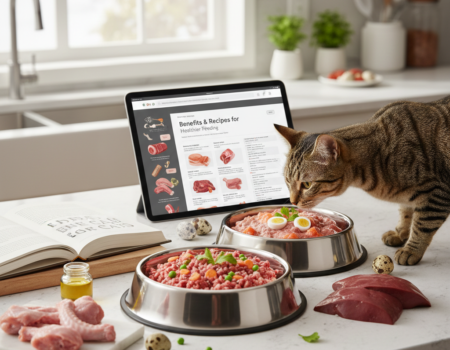“Let food be thy medicine and medicine be thy food.” – Hippocrates
When it comes to feeding our beloved feline friends, we often find ourselves wondering what is safe and healthy for them to eat. One question that frequently arises is whether cats can eat rice. As a responsible cat owner, it’s important to understand the nutritional needs of our furry companions and make informed choices about their diet.
Rice is a staple in many human diets and it may seem like a viable option for our cats as well. However, the dietary requirements of cats differ significantly from our own. Cats are obligate carnivores, meaning they rely on meat as the primary source of nutrition. Unlike humans, cats lack certain enzymes necessary to digest and utilize plant-based foods effectively.
While rice is not inherently toxic to cats, it does not offer much nutritional value for them. Cats derive essential nutrients, such as protein and amino acids, primarily from animal sources. Carbohydrates like rice do not provide the necessary nutrition for their optimal health and can even contribute to health problems such as obesity and diabetes in the long run.
It’s important to note that rice should not replace their regular cat food. However, small amounts of cooked plain rice can be given to cats as an occasional treat or as an ingredient in specially formulated cat food. When feeding rice to cats, it is crucial to monitor their reaction closely and consult with a veterinarian if any discomfort or side effects occur.
Key Takeaways:
- Rice does not provide significant nutritional benefits for cats as they are obligate carnivores.
- Feeding cats small amounts of cooked plain rice as an occasional treat is safe, but it should not replace their regular cat food.
- Cats have difficulty digesting and processing carbohydrates like rice, which can lead to digestive issues.
- If you have concerns or questions about feeding rice to your cat, consult with your veterinarian for personalized advice.
- Cats benefit most from a diet rich in animal protein and fat, so there are better options to consider than rice.
Do Cats Need Grains in Their Diet?
Cats are obligate carnivores, which means their diet should primarily consist of meat. Grains, such as rice, do not provide much nutritional value for cats and are not necessary in their diet. In fact, cats have natural feeding habits that resemble those of their wild counterparts, who consume whole prey to obtain the necessary nutrients from meat.
Unlike humans and some other animals, cats do not have the necessary enzymes to digest and process carbohydrates efficiently. Their digestive system is designed to break down and absorb nutrients from animal proteins and fats, not grains. Cats require a diet that is rich in high-quality animal protein and includes essential amino acids to support their overall health and wellness.
When cats consume grains, it can be challenging for them to digest, leading to potential digestive issues and discomfort. Additionally, grains do not provide the same nutritional benefits as meat does for cats. While grains may contain small amounts of protein, fiber, vitamins, and minerals, cats are unable to extract and utilize these nutrients effectively.
Ultimately, the natural feeding habits of cats prioritize meat consumption over grains. Their bodies have evolved to thrive on a carnivorous diet, which is essential for meeting their nutritional needs and maintaining optimal health.
To illustrate the importance of a meat-based diet for cats, here is a comparison of the nutritional content between grains and meat:
Nutrient Grains (e.g., rice) Meat (e.g., chicken) Protein Low High Amino Acids Incomplete Complete Taurine Minimal or Absent Essential Vitamins (e.g., B12) Limited Abundant Minerals (e.g., Iron) Minimal or Absent Rich
Note: The table above is for illustrative purposes only and does not represent an exhaustive list of nutrients found in grains and meat.
As shown in the table, meat provides cats with higher levels of essential nutrients, complete amino acids, and vital substances like taurine, which is crucial for their heart and eye health. These nutrients are essential for cats to thrive and meet their dietary requirements.
In conclusion, cats do not need grains in their diet. A meat-based diet that reflects their natural feeding habits as obligate carnivores is best for their health and well-being. By providing cats with a diet that consists of at least 70% meat, you can ensure they receive the necessary nutrients and thrive according to their biological needs.
The Carnivorous Diet of Cats
Cats are natural-born hunters and have unique dietary needs. In the wild, their diet consists mainly of meat, which provides essential nutrients and fuels their carnivorous instincts. Hunting prey allows cats to obtain all the necessary nutrients, including protein, amino acids, vitamins, minerals, and fatty acids, ensuring their optimal health and reproduction.
The natural feeding habits of cats revolve around consuming whole prey, including bones, muscles, organs, and other parts. This natural diet not only provides the necessary nutrients, but it also supports dental health, strengthens muscles, and promotes healthy digestion.
While domesticated cats may not have the opportunity to hunt for their food, replicating their natural feeding habits as closely as possible is crucial for their well-being. This includes feeding them a diet that prioritizes high-quality animal-based proteins, such as those found in commercial cat food formulated specifically for their nutritional needs.
Is Rice Nutritionally Valuable to Cats?
Rice does not have much nutritional value for cats. It is primarily a source of carbohydrates, which cats have limited need for. The feline digestive system is designed to process meat, not grains. While rice does contain some nutrients like protein, fiber, vitamins, and minerals, cats are unable to properly digest and absorb these nutrients from rice. Therefore, rice should not be considered a valuable component of a cat’s diet.
Rice Nutrients for Cats
Although rice contains protein, fiber, vitamins, and minerals, these nutrients are not easily digested and absorbed by cats. Unlike humans and some other animals, cats lack the necessary enzymes to break down and utilize the nutrients present in grains like rice. Cats have evolved as obligate carnivores, meaning their bodies are designed to derive essential nutrients from animal sources, particularly meat.
The nutritional profile of rice is not tailored to meet the specific dietary needs of cats. While it may offer some trace amounts of essential nutrients, these are insufficient to support a cat’s optimal health.
Cat Dietary Needs and Digestion
Cats require a diet that is rich in animal protein and fat to thrive. Their bodies are adapted to metabolize and utilize nutrients found in meat. Cats have a shorter digestive tract and higher acidity in their stomachs, which enables them to efficiently process and extract nutrients from animal-based foods.
Carbohydrates like those found in rice are not a necessary component of a cat’s diet. In fact, excessive carbohydrate consumption can lead to health issues such as obesity, diabetes, and digestive problems in cats.
Importance of a Meat-Based Diet
A meat-based diet is essential for meeting a cat’s nutritional needs. Providing cats with a balanced, species-appropriate diet that mimics their natural feeding habits is crucial for their overall well-being.
“Cats are obligate carnivores and require a diet that is rich in animal protein for optimal health.” – Dr. Emily Johnson, DVM, Feline Nutrition Specialist
Nutritional Comparison – Rice vs. Meat
| Nutrient | Rice | Meat |
|---|---|---|
| Protein | 4g per 100g | 20g per 100g |
| Fat | 0.5g per 100g | 15g per 100g |
| Vitamin A | 0 IU per 100g | 2000 IU per 100g |
| Taurine | N/A | 1000mg per 100g |
Note: The data in the table is for illustrative purposes only and may vary depending on the specific type of rice and meat.
As shown in the table above, meat provides significantly higher amounts of essential nutrients such as protein, fat, vitamins, and taurine compared to rice. Taurine, in particular, is an essential amino acid that is vital for a cat’s heart health and overall well-being, and it is not found in plant-based foods like rice.
Benefits of Feeding Cats Rice
While rice may not have significant nutritional benefits for cats, there are some potential benefits to feeding them small amounts of rice.
Cooked plain rice is nontoxic and safe for cats to eat as an occasional treat.
Cats often enjoy the texture and taste of cooked rice, and it can be used as a special reward or as a way to add variety to their diet. Additionally, rice can be used as a filling ingredient in commercially available cat foods, providing a different texture and flavor for added enjoyment.
Some veterinarians recommend boiled or plain rice as a remedy for gastrointestinal issues and constipation in cats.
Plain rice can be soothing to the digestive system and may help alleviate minor stomach discomfort or irregular bowel movements.
In particular, brown rice contains fiber that can aid in regulating the digestive system and preventing constipation. However, it’s important to note that rice should not be used as the sole solution for chronic gastrointestinal issues, and any persistent symptoms should be addressed by a veterinarian.
| Benefits of Feeding Cats Rice |
|---|
| Can be given as an occasional treat |
| Provides variety in texture and flavor |
| May help with gastrointestinal issues |
| Aids in preventing constipation |
It’s important to remember that rice should only be given in small amounts and should never replace a cat’s regular diet. While it can have some benefits, cats primarily need a meat-based diet to meet their nutritional requirements. If you’re considering feeding rice to your cat or if you have any concerns about their diet, it’s always best to consult with your veterinarian for personalized advice.
Downsides of Feeding Cats Rice
While rice is generally safe for cats to eat, there are some drawbacks to consider. Feeding cats rice as a significant part of their diet can have negative effects on their overall health and well-being. Here are some of the key downsides of including rice in a cat’s diet:
1. Limited Nutritional Benefits
Rice does not provide significant nutritional benefits for cats. As obligate carnivores, cats require a diet primarily composed of animal protein to meet their nutritional needs. Rice, being a carbohydrate, does not offer essential nutrients that contribute to a cat’s optimal health. Feeding them too much rice can prevent them from getting the necessary nutrients from their meat-based diet.
2. Digestive Issues
Cats may have difficulty digesting and processing carbohydrates like rice. Their digestive systems are designed to metabolize meat efficiently, but they lack the necessary enzymes to fully break down complex carbohydrates. This can lead to digestive issues such as gas, bloating, and diarrhea when cats consume rice in large quantities.
3. Health Problems
A diet high in carbohydrates, including rice, can contribute to health problems such as obesity and diabetes in cats. Cats have limited ability to process carbohydrates and convert them into energy. When cats consume excessive amounts of carbohydrates, their bodies may store the excess as fat, leading to weight gain and obesity. Additionally, a high-carbohydrate diet can disrupt blood sugar levels and increase the risk of developing diabetes in cats.
4. Incomplete Nutrition
Feeding cats a diet primarily consisting of rice can result in incomplete nutrition. Rice lacks essential nutrients that cats need for optimal health, such as certain vitamins, minerals, and amino acids. Cats require a balanced and varied diet to thrive, and relying solely on rice as a food source can lead to nutrient deficiencies and related health problems over time.
| Downsides of Feeding Cats Rice |
|---|
| Limited Nutritional Benefits |
| Digestive Issues |
| Health Problems |
| Incomplete Nutrition |
While rice can be included in a cat’s diet in small amounts as an occasional treat, it is not recommended as a staple food. It is important to prioritize a balanced and nutritionally complete diet that primarily consists of animal protein to ensure the optimal health and well-being of your feline companion.
How to Feed Rice to Cats
If you decide to feed rice to your cat, there are some guidelines to follow. Serve plain cooked brown or white rice in small portions, as a treat or occasional addition to their diet. Keep in mind that rice should not replace their regular cat food, as it does not provide the necessary nutrients for their optimal health. Avoid adding any seasonings, sauces, or other ingredients to the rice, as they may be harmful to cats. Monitor your cat’s reaction to rice and consult with your veterinarian if you have any concerns.
| Rice Portion | Description |
|---|---|
| Small portions | Serve plain cooked rice in small amounts to avoid any digestive issues. |
| Treat or occasional addition | Use rice as a treat or occasionally add it to your cat’s diet, keeping in mind that it should not replace their regular food. |
| Avoid seasonings or sauces | Do not add any seasonings, sauces, or other ingredients to the rice as they may be harmful to cats. |
| Monitor your cat’s reaction | Observe your cat’s behavior and well-being after feeding rice, and consult with your veterinarian if you have any concerns. |
Other Food Options for Cats
If you want to share food with your cat, there are many other healthier options than rice. Cats benefit most from a diet rich in animal protein and fat. Suitable meat-based options for cats can include chicken, turkey, beef, tuna, and salmon. These foods provide essential nutrients and are more natural for cats to eat. Always make sure the meat is cooked, free of spices or other ingredients, and remove any inedible parts such as bones. It is important to keep portion sizes small and monitor your cat for any adverse effects.
If you’re unsure about specific cat-friendly human foods, consult with your veterinarian for a comprehensive list of safe options. They can guide you in selecting appropriate meat options that meet your cat’s dietary needs. Remember, a well-balanced diet is essential for your cat’s overall health and well-being.
Benefits of Feeding Meat to Cats
Feeding meat to cats offers numerous benefits and helps support their natural diet. Here are some key advantages:
- Protein-rich: Meat is an excellent source of high-quality protein, which is essential for cats’ muscle development, energy production, and overall health.
- Nutrient-dense: Meat contains essential vitamins and minerals that cats require for optimal growth and vitality. It provides vital nutrients like iron, zinc, and vitamin B12.
- Improved Digestion: Cats have a short digestive tract specifically designed for quickly digesting and absorbing animal-based proteins. Feeding meat can help promote better digestion and nutrient absorption in cats.
- Palatability: Cats are naturally drawn to the taste and texture of meat. Feeding them meat satisfies their carnivorous cravings, making mealtime more enjoyable.
Remember, when introducing new foods to your cat’s diet, do it gradually and in moderation. Monitor their reaction and consult your veterinarian if you have any concerns or questions.
| Cat-Friendly Foods | Benefits |
|---|---|
| Chicken | – High in protein – Good source of B vitamins and minerals |
| Turkey | – Lean protein source – Contains essential amino acids |
| Beef | – Rich in iron and zinc – Provides essential fatty acids |
| Tuna | – High in protein and omega-3 fatty acids – Helps support heart and brain health |
| Salmon | – Excellent source of omega-3 fatty acids – Promotes healthy skin and coat |
Conclusion
In conclusion, while it is true that cats can eat rice, it should not be a significant part of their diet. As obligate carnivores, cats require a meat-based diet to thrive and receive essential nutrients. Rice, on the other hand, does not offer significant nutritional benefits for cats and can even contribute to health problems like obesity and diabetes.
Feeding cats small amounts of plain cooked rice as an occasional treat is safe, but it should never replace their regular cat food. It is crucial to prioritize a balanced and nutritious cat diet to ensure their optimal health and well-being.
If you have any concerns or questions about feeding rice to your cat, it is always best to consult with your veterinarian for personalized advice. They can provide expert guidance based on your cat’s specific dietary needs and overall health.
FAQ
Can cats eat rice?
Yes, cats can eat rice. However, it is not recommended as a significant part of their diet.
Is rice nutritionally valuable to cats?
Rice does not provide much nutritional benefit for cats and can be difficult for them to digest.
Do cats need grains in their diet?
Cats do not need grains in their diet, as they are obligate carnivores.
What are the benefits of feeding cats rice?
Feeding cats small amounts of rice can be used as a filling ingredient in cat foods and as a remedy for gastrointestinal issues and constipation.
Are there downsides to feeding cats rice?
Feeding cats too much rice can prevent them from getting sufficient nutrients from their meat-based diet and can lead to digestive issues.
How should rice be fed to cats?
Rice should be served plain, in small portions, as an occasional treat or addition to their diet.
What are some other food options for cats?
Cats benefit most from a meat-based diet. Suitable options include chicken, turkey, beef, tuna, and salmon.










No Comment! Be the first one.